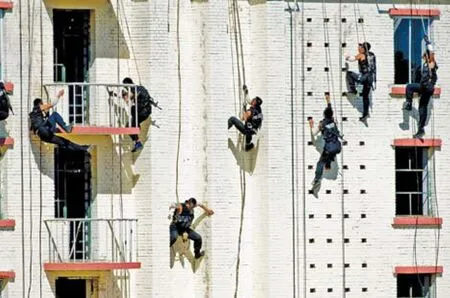Threatened, Yet Undaunted
2011-10-14ByFUXIAOQIANG
By FU XIAOQIANG
Threatened, Yet Undaunted
By FU XIAOQIANG
China joins the world community in addressing evolving terrorist threats

Since Al Qaeda’s devastating attacks against the United States on September 11, 2001, terrorism has emerged as a pressing challenge to world peace. Antiterrorism has remained at the top of the global security agenda over the past decade. As a permanent member of the UN Security Council, China has made great contributions to the global antiterrorism campaign.
Policy
Since the late 1990s, the Chinese Government has recognized terrorism as a common menace to the world. It has put forward a series of insightful ideas on combating terrorism. For instance, its “new thinking on security” points out that non-traditional security problems, terrorism in particular, have posed an imminent threat to the international community. China believes terrorism results from complex political, economic, ethnic,religious, historical and cultural factors,coupled with poverty, development gaps and various social injustices.
China advocates an antiterrorism approach centered on international cooperation.The world community should adopt integrated political, economic, diplomatic, military and legal measures to cope with terrorism,instead of simply relying on the use of force.
Since the September 11 terrorist attacks,China has strengthened international antiterrorism consultation, shared antiterrorism intelligence with other countries and helped freeze terrorist organizations’ assets. China’s initiatives have exemplified its belief that countries should work in concert to safeguard global security.
Participation
China is one of the first countries to conduct international antiterrorism cooperation. At the third summit of the Shanghai Five—the predecessor of the Shanghai Cooperation Organization (SCO)—in 1998,China, Russia, Kazakhstan, Kyrgyzstan and Tajikistan pledged to jointly fight against international terrorism.
The Shanghai Five admitted Uzbekistan into the group and founded the SCO in June 2001. Upon its inception, SCO member states signed the Shanghai Convention on Combating Terrorism, Separatism and Extremism, ushering in a new era in their cooperation against terrorism. In the convention, the six nations stated in no circumstances should terrorist acts be “subject to acquittal based upon exclusively political,philosophical, ideological, racial, ethnic, religious or any other similar considerations.”
Following the September 11 terrorist attacks, China established antiterrorism dialogue and coordination mechanisms with many other countries including the United States, Russia,Pakistan and India. The mechanisms have allowed China to consult and cooperate with these countries on a regular basis.
Over the past decade, China has taken an active part in regional antiterrorism cooperation within the frameworks of the SCO and the Asia-Pacific Economic Cooperation (APEC) forum. Notably, it contributed to the establishment of the SCO Regional Antiterrorism Structure in Tashkent, Uzbekistan. It has also carried out antiterrorism exercises with neighboring countries, including other SCO members as well as Pakistan and India.
In addition, China has injected impetus into the global antiterrorism process. In October 2001, China, as the host country of that year’s APEC Summit, incorporated antiterrorism into the agenda. The APEC Leaders’ Statement on counterterrorism adopted at the summit offered great moral support to the United States’ War on Terror in Afghanistan. After the fall of the Taliban regime, China assisted with Afghanistan’s reconstruction in the hope of safeguarding regional security and stability.
While involving itself in the global antiterrorism campaign, China has boosted antiterrorism efforts at home. It has amended laws on punishing terrorist crime,established an antiterrorism coordination system, organized professional antiterrorism forces and improved antiterrorism contingency plans.
China’s commitment to fi ghting against terrorism is illustrated by its stern stance against “East Turkistan” terrorist forces.“East Turkistan” terrorists have launched numerous terrorist attacks in China and other countries, threatening China’s security as well as regional and global peace and development. In accordance with UN antiterrorism resolutions and China’s laws and regulations, the Chinese Government has intensified crackdown efforts in recent years. It has also issued lists of “East

(Left)JOINING FORCES:The Chinese Navy’s Guangzhou destroyer (left) participates in the Aman-09 multinational naval exercise in Karachi, Pakistan, in March 2009 along with a U.S. Coast Guard vessel
Following the September 11 terrorist attacks,China established antiterrorism dialogue and consultation mechanisms with many other countries including the United States, Russia,Pakistan and India Turkistan” terrorist organizations and terrorists, which has been accepted by other countries including the United States.
Trend
Along with the development of globalization and information technology,international terrorism has exhibited new features. The trend has been evident especially since U.S. forces killed Al Qaeda leader Osama bin Laden in Pakistan in May and turmoil broke out in the Middle East and North Africa earlier this year. Al Qaeda has received a heavy blow and is now less able to commit acts on par with the September 11 attacks.But the appeal of its ideology has remained strong, as evidenced by the rise of its regional branches and af fi liates.
Worse still, terrorist threats have been scattered around the world and even spread into cyberspace. For instance, European right-wing extremists have asserted themselves by launching lone-wolf terrorist attacks and committing violent crimes in the aftermath of the global fi nancial crisis.Mounting threats of cyber terrorism—the use of Internet-based attacks such as computer viruses in terrorist activities—call for strengthened international cooperation and coordination.
Antiterrorism has become a more strenuous and complex task for the international community a decade after the September 11 attacks. In this context, there is a growing need for countries to work together to eliminate the breeding grounds for terrorism.China, a major developing country devoted to world peace, development and harmony,appears poised to play a bigger role in this endeavor.

MOVING UP:Chinese special police officers take part in an antiterrorism drill in Beijing on September 23, 2010
China’s Antiterrorism Stance
In keeping with its concepts of pursuing “peaceful development” and building a “harmonious world,”China has pursued a four-pronged antiterrorism policy over the past decade:
● It opposes double standards and holds the view that the international community should take a consistent stance against terrorism. Countries should combat terrorist acts no matter what forms they take, when and where they occur or what their targets are.
● While fighting against terrorism, the leading role of the UN and its Security Council should be brought into full play. All antiterrorism operations should abide by the UN Charter and other international conventions. They should be based on concrete evidence and clearly targeted,
thus avoiding harm to innocent people. No country shall expand the scope of the operations at will.
● Antiterrorism efforts should address both the symptoms and root causes of terrorism. Countries should not only focus on solving current problems, but also need to consider long-term antiterrorism solutions.Narrowing the gap between the South and the North is of pivotal importance. Given the impact of the global financial crisis, the international community should give greater prominence to the development issue.
● The antiterrorism campaign is a battle between peaceful and violent forces, rather than a clash between ethnic groups, religions or civilizations. Terrorists—a small number of evil-doing extremists—should not be linked with certain ethnic groups or religions. China stands for the long-term coexistence of different social systems and civilizations, which will develop side by side as they seek common ground while shelving differences.
The author is director of the Center for Counterterrorism Studies at the China Institutes of Contemporary International Relations
